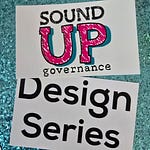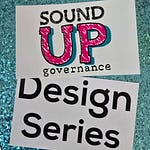TRANSCRIPT:
Matt 00:05
Welcome to episode 1 of Sound-Up Governance. My name is Matt Fullbrook, and today I’m chatting with my friend, Tiziana Casciaro, Professor of Organizational Behaviour at the Rotman School of Management at the University of Toronto. We launched the Ground-Up Governance newsletter with the most fundamental concepts in corporate governance: “authority” and “power.” I mean, what could be more essential to corporate governance than trying to understand who is allowed to do what, and what it takes for one person to influence another person? Luckily for us, Professor Casciaro recently co-authored a book with Harvard’s Julie Battilana called Power, for All: How it Really Works, and Why it’s Everyone’s Business. And just so I don’t miss anything, why don’t we let her tell us a bit more?
Tiziana
It's a book intended for all in this world, not only in Canada, not only the US, but really, truly everywhere, who have contended with power, have struggled with it been frustrated by it, while understanding that it's important for them to have it, and know how to use it. And we have tried to give tools and understandings that allow people to grow in their influence, but also learn how to deploy it for good.
Matt
It never much occurred to me to think very hard about what power really is, or how, if at all, it's different from authority, or why, for example, people in really visible or influential positions sometimes fail to make a difference, am I missing something
Tiziana
Power is often very much confused with authority, or or I should say, authority is often confused with power. They are different, however. Authority is the formal right to issue orders and directives and make decisions. And it comes from the position you occupy in a formal structure. So your role puts you in a place where you get to make certain decisions. Power is different, however. Power is the ability to influence the behavior of other people. And you can influence them sometimes through your formal authority. If I have the right to decide whether you're going to be promoted or not, that gives me power over you. It's not just authority, but it's actual power. Why? Because you want something from me: a promotion. I have control over your access to this thing you want because I have the right to decide whether you will be promoted or not. And therefore I exercise influence over you. That's what power is made of. It's made of controlling your access to something you desire. But you see, already in the definition of power, that I may control, access to something you want without having formal authority.
Matt
So can a person create power? Does that even make sense?
Tiziana
Absolutely makes sense. A person can increase their power, if they understand this simple principle of where power comes from. If I know that power comes from controlling access to resources you want, all I need to accrue more power is understand what is it that you want. And that's where people become very confused between the notion of formal authority and the power broadly conceived, formal authority has to do with something very specific. I have certain decision rights in a certain context over certain things. But that covers only a small part of what you might want, you might not just want a promotion, you might want for instance, to be managed by somebody who understands you, that understands your gifts, your talents, your complexity as a human being, values it and makes you feel good by giving you a platform where you can be your best self every day at work. Those are much more psychological resources, that are not written down in any formal organizational structure. They are much more subtle, and yet they are extremely important to people, they drive who they want to associate themselves with, whether they I want to be led by you or not, whether I will trust the decision you make. And even if you make a decision through your formal authority, and the decision comes at me, your actual underlying power - so, your ability to influence my behavior - will come down to how willing am I to execute on that decision?
Matt
Okay, now we're really getting somewhere. No wonder some people have authority, but still can't get anyone to do anything. Power isn't only about controlling access to tangible resources, in some cases is way more important to just make someone feel good, feel valued and motivated. Since Ground-Up Governance is ultimately about corporations, how does all this apply in a typical corporate structure with a board, a CEO...in other words, a model that's got a well defined, built in leadership hierarchy. Once again, here's Professor Tiziana Casciaro.
Tiziana
The problem of the hierarchical structure you're describing is that it tends to concentrate power in the hands of very few people. And what we know from research in all kinds of disciplines is that power concentration tends to be bad in the long run, not only for the majority of people who don't have power, and therefore are just on the receiving end of the decisions of the few. But it can also be detrimental to the few in power, to the extent that having that much control can lead them to abuse their power. They lose sight of their unilateral capacity to shape the life of others and the other people who are receiving these decisions. Sometimes they become resentful of this asymmetry. And for good reason, if they're not unreasonable in becoming resentful. And when you have resentful people that you're leading, it's not good. Because they might push back, they do push back, the moment they have a little bit of room to show you that you're abusing your power. And I don't like it.
Matt
Uh oh So, concentrating power at the top of an organization sounds risky. What about a board of directors? How do power and authority work there?
Tiziana
So, you are a director on a board. And and because of that role, you will have certain rights to issue directives for the company and its leadership, and jointly with the other board members, you can come up with certain decisions that then presumably get implemented. So imagine one of these board members that in addition to the formal authority that accrues to them, by virtue of occupying that position on the board, they have something else going on for them. Maybe they have extra good connections to a stakeholder that the management of the company cares about, or that the board cares about. And they have to go through me to get to those guys in that stakeholder groups. In that case, I will end up having more influence over the decisions of the board and the behavior of the executives that leave the company, because I've got something that they want. And I control it in the sense that there aren't many alternative ways for them to get to those stakeholders, they kind of have to go through me.
Matt 08:30
It almost seems like part of the problem is the way that boards are structured, I asked Professor Casciaro if we should be trying to build boards so that every director somehow has an equal amount of power. I mean, maybe that would be the ideal condition for making good decisions and balancing everyone's interests.
Tiziana
The reality is that resources are unequally distributed across each and every one of us. And it's unavoidable that you will not have the quality you're describing on the board. But what you can do is to create decision making processes that make it harder for people to go off and establish relationships of influence that are disconnected from the goal that the board is presumably pursuing. So you can have decision making structures where it's one board member, one vote, that you have a way to express your preferences that does not allow easily for you to be swayed by others, which could protect you from their influence when it stems from things that have nothing to do with a decision at hand.
Matt
All right, so maybe it isn't possible to distribute power equally, but we can just use processes that balance things out a little. That's what we should be working on right?
Tiziana
But then you lose something when you do that. When you create a structure in which the decision is made almost independently by each board member, what you lose is the learning and the ability to engage with ideas other than your own that can actually and actually do oftentimes improve decision making. I can come in with my own independent judgment, which is all fine and dandy because it becomes not subject to your undue influence as my fellow board member. But I don't get to hear your argument, I don't get to really make my own decision better, because I don't get your input. So that's what what you're the tension, you're juggling here, you're navigating this pull toward independence, but also want to secure the beauty of multiple minds, struggling with a complex decision, where each and every one of us individually, cannot really understand every component.
Matt
We've learned how authority and power are different, and that people can in fact, take steps to generate power. We've all heard about the potential corrupting effects of power socially - morally, even - can we take steps to, you know, use our power for good?
Tiziana
Ultimately, you're going to have to contend with what you have done with your life. What have you impacted? What are you leaving behind? And this is a level of insight into yourself that sometimes escapes us when we are in the middle of the action. We are the CEO of a company, complex stuff coming at us from every which way, and we kind of forget that actually, we want to accomplish something here. In addition to being rich and famous. We want to accomplish something other than that. So it's very important for people to understand that there are many goals you can accomplish. And power is essential to accomplishing all of them. You cannot get anything done without power. It's a form of energy in many ways that allows you to change the world around you, and move it in a direction you think is worthwhile. So you have to empower, for lack of a better word, people to acquire the power they need to pursue those objectives. And sometimes the people that have formal authority are not the right people. They're not pursuing the right objectives anymore. Maybe they started out with dreams and ambitions that were perfectly good and constructive, but along the way they lost sight of them. So the book tries to give everybody an opportunity to understand how power works so that they can acquire it, and then set up their power - and this is something that boards actually are very important contributors to - set up their power so that they don't get lost along the way. Because power does go to our head. It does. It does contaminate our purpose. It does distract us from our limitations and our need for other people to help us along the way. It makes us hubristic, it makes us self focused. So you need to not only give people tools to acquire power, but also give them tools to keep it in check.
Matt
Thank you for listening to episode number one of Sound-Up Governance. In the next episode, I'll speak with Lieutenant Colonel Jamahl Evans, Sr. of the US Marines about what “duty” and “accountability” mean to him. If you want to reach out with a question or insight or an interesting story, send an email or voice memo to soundup@groundupgovernance.com. And we may feature you in a future episode. Thank you for tuning in. See you next time.














Share this post